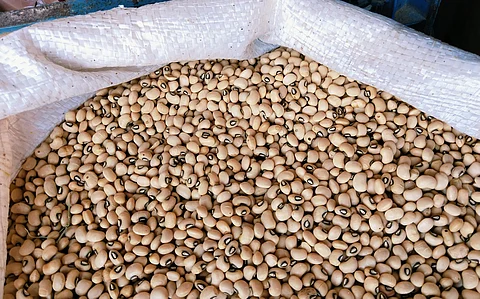

In Odisha’s Nayagarh district, the Raisar Community Indigenous Seed Bank has been preserving old and valuable seeds. Among the paddy and millet varieties carefully stored in clay jars and ash-lined containers, is cowpea, a legume that scientists now believe could be vital in the global fight against climate change.
The seed bank, managed by local farmers with support from non-profit Nirman actively conserves indigenous cowpea varieties such as Ranga Baragadi, Batula Chana, Sarukhunda Biri, Mankada Danti, Laha Kankadadandi, Baragadi, and Tula Baragadi, each adapted to the region’s erratic rainfall, poor soils, and pest pressures.
These traditional landraces are naturally climate-resilient, able to survive heat, drought, and poor soil conditions. As a legume, cowpea also improves soil fertility through nitrogen fixation, making it valuable in low-input farming systems.
Cowpea is known by many names across India like barbate or lobia in Hindi, Chavli in Marathi, karamani in Tamil, and Alasandulu in Telugu. It is a protein-rich pulse and a survivor, as it is naturally drought- tolerant and able to grow in poor soils with little water. It has long been staple for smallholder farmers across dry land regions of India.
These are not just seeds but are our future, Prashant Mohanty, Nirman’s executive director, told Down To Earth. “Tula Baragadi can survive drought and pests. Sarukhunda Biri grows well in poor, dry soil.”
India is home to many efforts to conserve cowpea. In Karnataka, the Janadhanya Seed Network grows cowpea that is pest-resistant and drought-tolerant. In Telangana, the Sangham Seed Bank supported by the Deccan Development Society, saves a local cowpea (bebbarlu). It not only gives food but also fixes nitrogen in the soil and can be used as fodder.
Delhi-based Centre for Science and Environment (CSE)’s 2025 report on the status of community seed banks highlights how traditional varieties conserved by farmers are naturally climate-resilient, having adapted to withstand extreme weather conditions like drought and heat.
On May 30, 2025, a group of researchers from Italy and Mozambique published a study in the journal Communications Biology. They looked at 389 types of cowpea, mostly traditional ones from Southern Africa. Using modern DNA tools, they checked how these seeds were linked to weather conditions like heat and rain in areas where they were originally grown.
Their findings confirm what Indian farmers have known all along: Cowpea is built to survive tough conditions. The researchers found 36 genetic regions linked to traits that help the plant survive high temperatures, irregular or little rainfall and poor soil.
One of the most important discoveries was a gene on chromosome 7 called GIGANTEA, which helps cowpea flower at the right time, depending on sunlight and temperature. This is very important as weather becomes harder to predict.
They also used computer models to see how these seeds would do in the future climate (between 2041 and 2060). In some places like Zimbabwe and Tanzania, current cowpea types may not do well unless stronger ones are used.
This shows why we must protect and use climate-resilient cowpea seeds now, before they are lost.
In India, many of these resilient traits are already being preserved in community seed banks like Raisar Community Indigenous Seed Bank.
India’s food production dropped in 2023-24 because of bad weather, long dry spells, unseasonal rain, and heat waves. Crops like cowpea, which survive these conditions, are not just helpful; they are essential.
But traditional seed systems are in danger. Many farmers now use hybrid seeds, which don’t grow well in dry lands and cannot be saved for the next season. Seed companies and lack of support from government policies are also causing farmers to forget local varieties like cowpea.
The global cowpea study and CSE’s India report both highlight the need to integrate traditional crops into national climate strategies.
As the world look for new ways to grow food in a changing environment, India already has answers. Only recognition and continued cultivation are needed.